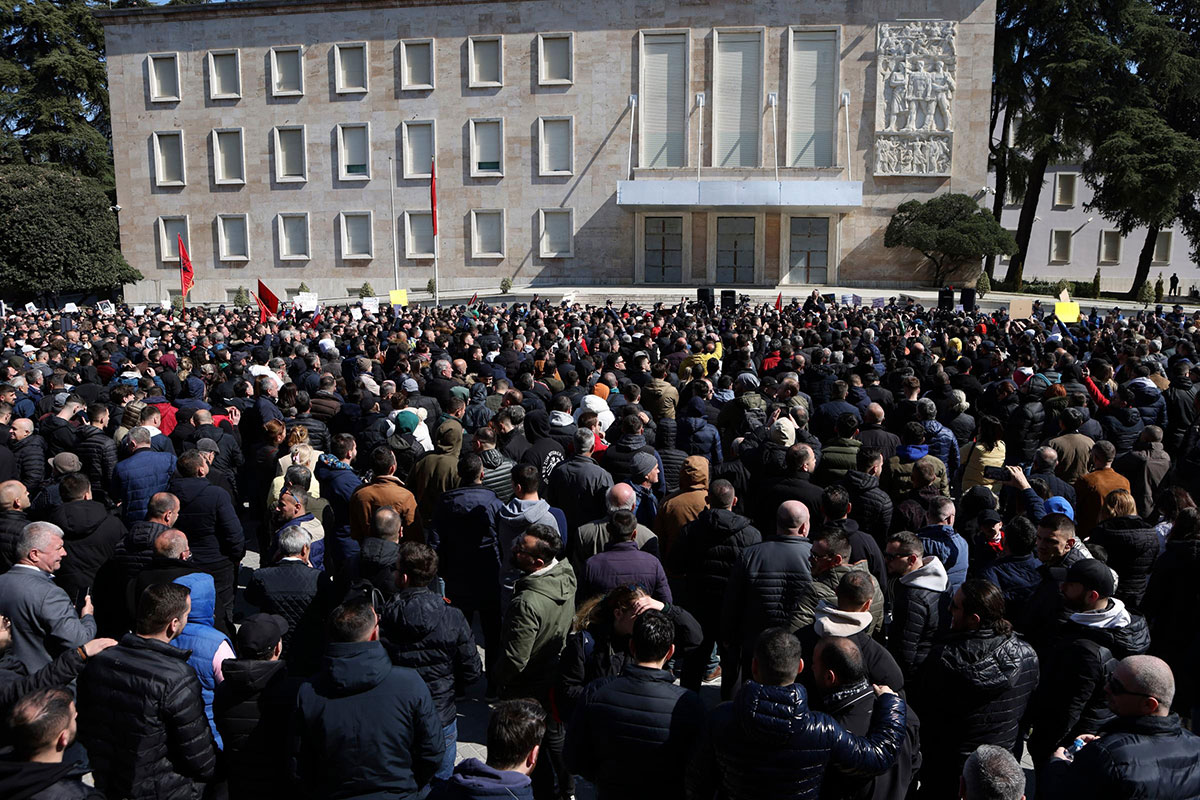While the war in Ukraine continues to rage, for thousands of Albanians it is a continual battle to feed their families and pay their bills. Their protests don’t come from a place of non-compassion, but rather a primal urge to survive.
Gathered on the main boulevard of Albania’s capital city, a group of youngsters stands with Ukrainian flags draped around their shoulders. Banners and flowers are strung above their heads to mark the national celebration of the start of summer, but the group is not there to celebrate.
For seven days and counting, Albanian citizens have been protesting over price increases of food, fuel, and energy. The government, however, has called them a national shame and accused them of their protests serving Russia and the Kremlin.
Following Russia’s invasion of its neighbor, prices of fuel, energy, and basic foodstuffs have risen significantly and on a global scale. Albania has not escaped this, but for its citizens, a third of which live below the poverty line, it is proving too much to bear.
The national statistics institution, INSTAT, found that the cost of 30 essential food items increased by 40% from January 2022, including meat, dairy products, cooking oils, and fruit and vegetables. The fuel cost has increased by 40%, and some struggle to pay increased energy bills.
All we want is help
One of the organizers, scholar, journalist and activist Rezearta Caushaj told Exit “The government has ridiculed the protests, tried to diminish their importance, and tried to shame us for protesting in times of war. Yet, what we ask is no more than our neighbors are getting: help for consumers and businesses to stay afloat with the ongoing crisis.”
She explained that recent tax cuts announced by the government are not enough, and the burden will be passed onto taxpayers in the end.
“It will have an even worse impact on our economy, one which is already butchered by corruption and controlled by few government-friendly oligarchs, - as is the case of the fuel trade, dominated by Kastrati, who are the only ones benefiting,” she said.
Caushaj added that most Albanians live off their salaries month to month and it is “immoral for our government to benefit from the higher influx of taxes in a time that regular citizens’ struggle.”
She further stressed that this issue has been present long before the war. “Our income is worth less than a week ago and will be worth less tomorrow. With the meager level of wages, people are starting to panic.”
The protests that have taken place across the country have brought together students, farmers, tourism stakeholders, activists, and regular citizens in some of the largest non-partisan demonstrations in recent years.
The protestors say that the increased cost of food items as well as fuel and electricity is too much for one of Europe’s poorest nations where the minimum wage is just EUR 240.
While the government has taken some steps to protect society’s most vulnerable, protestors argue that the increases in costs are so high that even those who previously were not at risk of poverty are now facing decisions such as feeding their families or keeping their homes warm.
United against Russia
But Prime Minister Edi Rama has nurtured rhetoric that protestors are demonstrating against the consequences of the war in Ukraine. This has further developed into claims that protestors are being paid to protest, are militants, and are “serving Putin”.
Caushaj was firm in her denials, ”I am in no way supported, influenced, or linked to Russia or anyone linked to Russia. I do not support the Russian invasion or any other country's invasion.
Martin Gjonaj, a representative from the country’s tourism sector also explained his motivations.
“What worries me is the well-being of my family directly affected by the price increases, and the total lack of responsibility and response from the government.”
 Source: impartialreporter.com
Source: impartialreporter.com
He is also clear that he does not support Russia and is “totally against the Russian attack on Ukraine, which is an attack on an independent and democratic country, and I condemn with my greatest strength this typical fascist aggression of Putin against the Ukrainian people.”
Exit also approached Organizata Politike, a left-wing civil society movement involved in organizing the protests. On the topic of Russian influence or sympathy for Moscow, they stated, “we categorically condemn the invasion of Ukraine by Vladimir Putin, and we stand in solidarity with the Ukrainian people who fight for their freedom.”
As for their motivation, they explained they believe the most obvious way of expressing malcontent and fighting back against repression is through protesting.
“This is the only hope for challenging the consolidated ruling elite in cahoots with a few oligarchs,” they said.
When it comes to rising prices, they said that a 40% increase in fuel prices equivalent to 20% of an Albanian daily income is unacceptable.
“It is a speculative maneuver by Edi Rama and the oligarchs who control the fuel industry in Albania. This has caused a general increase in the prices of the basket of goods, something which we consider as criminal in a country where 1/3 of the population lives below the poverty line, with the lowest minimum wage in the region,” a spokesperson explained.
Endemic state capture
Protestors believe the government’s deflection is deliberate in an attempt to take attention away from their other complaints; Albanian politicians are allowing market manipulation at the behest of powerful oligarchs and are involved in corruption and financial crimes.
Indeed, according to several different reports, including Transparency International, Albania is considered at significant risk of state capture and undue influence of the business elite.
Organizata Politike have criticised the government for a continued “inadequate response” to the 2019 earthquake that killed 51 people, the COVID-19 pandemic, and the consequences of war.
“The general feeling of frustration in Albania comes from many years of being robbed of public resources for the profit of a few individuals, as well as general incompetence from the government in managing the crises. At last, the people are reacting,” they added.
Caushaj also noted that the government has repeatedly used “war rhetoric” for the pandemic and other crises, but has failed to adequately assist citizens.
When asked about his grievances with the government, Gjonaj lists corruption, misgovernance, abuse of power, favouring monopolies and oligopolies- all of which he says become even more apparent in a crisis.
“I see the need for a civic response to this situation, so I have joined tens of thousands of activists and citizens in recent protests,” he said.
All I want is democracy and freedom
Exit also contacted Arben Kola, a tour guide and activist who was recently detained for three days for protesting.
“I am protesting for democracy, freedom, peace, prosperity and punishment for those who stole Albanian public money, land and destroyed everything, from heavy industry to beautiful rivers and national parks.”
Kola, who spends his weekends organizing public cleanups of rivers and lakes throughout the country, also wants real electoral reform to include the diaspora.
“We want to avoid a new dictatorship or someone like Putin in power,” he said, nodding to the 50 years of Albanian communist past.
When asked about the claims of Russian influence on the protest, he simply said, “Rama is the one that is indirectly supporting Russia through Open Balkan and his relationship with Vucic”.
He refers to the Open Balkan initiative comprising Albania, Serbia, and North Macedonia that foresees free trade and travel in the involved countries.
His faction of protestors believes that Albanian society and its members need the maximum government support and that their failure to do this is leading to increased poverty and high rates of emigration.
Various factions of protestors have made demands to the government and given a deadline of Saturday 19 March. If they are not met, protestors will meet again in the center of the city, to march on Rama’s office, demanding social and economic security.
While the war in Ukraine continues to rage, for thousands of Albanians it is a continual battle to feed their families and pay their bills. Their protests don’t come from a place of non-compassion, but rather a primal urge to survive.
Please refer to the Terms before commenting and republishing the content. Note: The views and opinions expressed in this article are those of the author and do not necessarily reflect the views of the Institute of Communication Studies or the donor.


